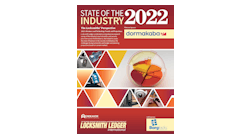Things are changing in the world in which locksmiths work. In the past, a very good living could be had if you were competent installing deadbolts, rekeying locks and occasionally opening the car of customers who locked themselves out. If you provided good customer service and kept your prices competitive, you could keep your customer base and even grow it with word of mouth referrals.
Things are changing, however. Now, for a locksmith to be relevant in today’s marketplace, he or she needs to understand so much more. These include transponder key programming for vehicles, patented cylinders and keys for commercial (and even residential) locks and electronic access control.
Electronic access control has no boundaries as there are dedicated commercial locks and residential locks. The Schlage Keypad Locks have been designed for residential applications. This product has been very successful in introducing locksmiths to access control products, whetting their appetite for more challenging installations. For commercial applications, the Schlage King Cobra 2 products extend the locksmith’s product offering, adding the ability to manage time zones and holidays and retrieve audits.
Electronic access control (EAC) products take many forms and most locksmiths are familiar with standalone, battery powered products and they are comfortable with installing and programming/servicing them. Today’s standalone EAC products have matured into sophisticated systems that can provide your customers with a very capable design for their access control needs. They can allow hundreds if not thousands of individuals to have access to an area, with time zone restrictions and the ability to audit their activities.
But, as technology increases, some of your customers will want more capabilities. For example, they may want to:
• Manage their openings (control the door locks) in real time.
• Receive notification of a number of activities including an alarm when a door is held open for too long.
• See what’s happening at the area around the opening via CCTV.
• Record access and egress and have it stored and available for viewing later.
Some of these capabilities can be challenging for today’s locksmith since it moves the installation into the traditional territory of a systems integrator. So… what’s a systems integrator? For access control solutions, a systems integrator could be defined as the individual or company that combines various components such as card readers, controllers, electrified hardware and CCTV cameras. They are also responsible for installing the software and working with their customer’s computer network to install what is known as the “head end.” This is the software that controls all the actions of the door hardware, receives the alarms and displays them and creates all the reports that the customer may want regarding access rights and audits. When combined, all of these components become a functioning access control system, customized for a particular customer’s needs.
How do they do that? They do it by consulting with the customer and working with them to understand what they want the system to do and what will meet their needs best, and then they design that system accordingly. Listening to the customer and understanding what is required to accomplish that goal is their job. This is called the “scope of work” and can be a challenge to get right, but it is vital that the customer communicate to the installation company what they require and that their needs are understood for the project to be a success. Asking the right questions is a skill that once learned will result in a successful project and a happy customer. The systems integrator has the ultimate responsibility for understanding the needs of the customer and designing a system that meets those needs.
Some locksmith companies are operating right now as systems integrators. Manufacturers of access control products are eager to help more locksmiths get proficient and comfortable installing and servicing these systems. Ingersoll Rand Security Technologies offers classes both locally and at the factories that will prepare an individual to enter this field. Almost every month, a three- or five-day class is available that covers the range of products from standalone to integrated systems. Our industry has always been one that trains the next generation of security professionals, and systems integration is no different.
Another opportunity for locksmiths to get experience with an on-line, integrated system is to team up with a company that is providing those services now.
Typically, a systems integrator is most comfortable working on the software, reader controllers and reader interfaces along with the card readers themselves. They are responsible for making all the wire terminations and for commissioning the system as well as training the end user on all the features of the software. But… they often struggle with the components “below the panel,” the electrified hardware and anything else that actually does the grunt work. Many components must be installed and connected to the panel to make the system work.
For example, the integrator may not be sure what kind of electrified hardware is required. Is that a mortise lock or a cylindrical, latch retract exit device or electrified trim? What manufacturer’s product will retrofit into that existing opening? A commercial locksmith knows the answers to these questions. This is where a partnership between a locksmith company and a systems integrator makes sense and adds real value for the end user.
In addition, a commercial locksmith knows what’s needed to keep the opening secure, which many times may extend beyond the electrified hardware. Does the door close on its own? If not, a new door closer is required, something an integrator may have never considered. Is there damage to the frame that prevents the opening from securing? The locksmith knows how to fix that. What about the key system? The most sophisticated access control is compromised when an inadequate key system is used or worse yet, the old operating key is left working the opening! The locksmith can consult with the end user to determine what will be best and that may lead to a new proprietary cylinder such as the Schlage Primus XP.
With the growing capabilities of standalone access control locks and the ability of software like the Schlage Security Management System (SMS) to manage both on-line and off-line openings, the time is ripe for locksmiths to add these products to their companies’ offerings and to reach out to systems integrators and make it known that they are able to partner up with them to offer the most comprehensive systems available to their customers.
Chris Clark started in the industry in 1975 as a commercial locksmith. He currently works for Ingersoll Rand Security Technologies in Southern California.





